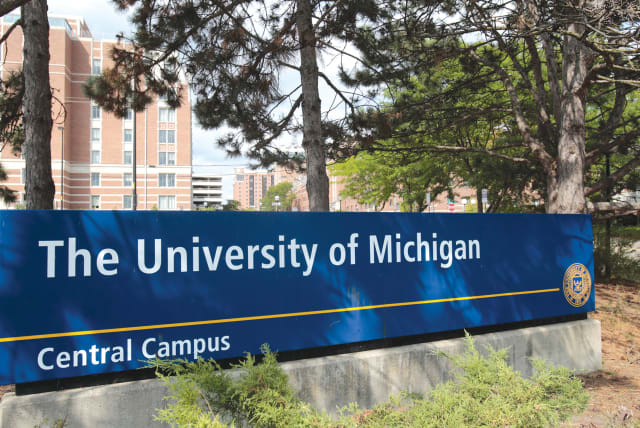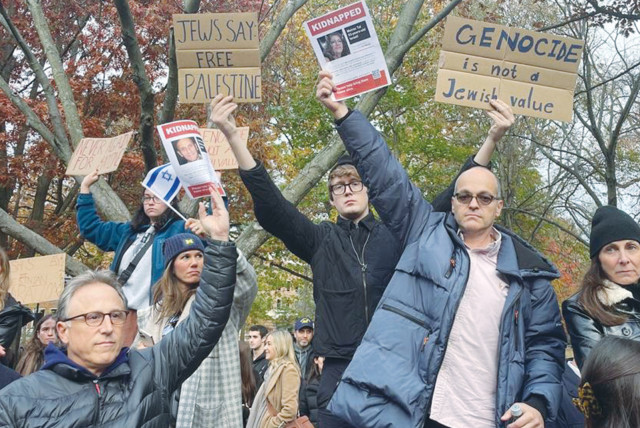Jewish students at University of Michigan strive for interfaith, inter-political dialogue

Resolutions against Israel further increased divisions on campus.
NEW YORK – To say that tensions were high on campus at the University of Michigan at Ann Arbor following the October 7 Hamas massacre in Israel would be an understatement.
The state’s flagship university is home to almost 50,000 graduate and undergraduate students. Approximately 8% of the student body is Jewish, and about 3% are Muslim, according to university data from 2016.
Pro-Palestinian and pro-Israel protests have ramped up in intensity. Two Arab students were the victims of doxxing (the intentional release of personal information to harass, intimidate, or bully), and Jewish students were harassed in classes and on social media.
More than 40 students involved with pro-Palestinian protests were arrested.
The university is among the dozens of colleges under civil rights investigation by the US Department of Education.The Michigan ACLU is also investigating university leadership for free speech violations.
ACLU Michigan alleged the university suppressed student speech by canceling a student government-initiated campus-wide vote on two resolutions. One resolution called for the university’s total divestment from Israel, and the other called for the university to recognize that Palestinian-Israeli tensions have been created through “systems of settler colonialism.” If passed, the resolutions would’ve been put forward to the university as recommendations.
The resolutions further increased divisions on campus. Though the student government met the requirements needed to put the resolutions to a campus-wide vote, university President Santa J. Ono said in a Dec. 5 statement that the proposed resolutions did more to stoke fear, anger, and animosity on campus than they would ever accomplish as recommendations to the university. Ono also said inappropriate use of the university’s email system relating to the vote led to its cancellation.
Anti-Defamation League CEO Jonathan Greenblatt praised Ono’s decision to cancel the vote in a November 30 post on X.
“From the beginning, this effort pitted students against one another and intensified hate at a time when Jewish students on campus were already vulnerable. The University of Michigan must now focus on bringing the community together,” Greenblatt said.
Facts on the ground
Ono’s initial statement following October 7 didn’t make any mention of Palestinians. According to senior Max Katz, this misstep ignited a huge anti-Israel sentiment across campus.
Katz, who is studying business and public policy, participated in Birthright Excel in 2022 when he spent the summer interning in Tel Aviv. He wasn’t involved in Jewish life until this experience, he said.
As anti-Israel protests and the movement for the resolutions gained traction on campus, Katz said he became upset with the rhetoric he heard, as he felt many of the protesters’ claims about Israel were untrue.
With several of his friends who had also participated in Birthright Excel, Katz said they decided an information campaign was necessary to bring awareness to why the vote could not pass. About ten other students joined Katz in the creation of Facts on The Ground, known as FOG.
FOG’s goal was to be as non-partisan, non-inflammatory, and non-religious as possible, Katz said. They used social media to share definitions of intifada, apartheid, and genocide.
FOG’s leadership team traveled to Washington DC and met with more than a dozen members of Congress to explain their efforts, and why it was important to vote against the resolutions.
FOG’s efforts in the fall semester culminated with an event featuring former congressman and current CEO of the American Jewish Committee Ted Deutch and Mosab Hassan Yousef, the son of one of Hamas’ founders.
“The idea was that we had an Arab advocate and a Jewish advocate to show that you cannot like Israel, but some of the words that we’re using to describe it are completely inflammatory and blatantly antisemitic,” Katz said.
Over 800 people attended the event in person, with another 800 attending virtually from more than 44 states and 12 countries. The recording on YouTube has 1.4 million views.
After the event, Katz said he was able to see the impact FOG had on the Jewish population on campus.The group’s initial audience was predominantly Jewish, pro-Israel students, though Katz said people with liberal perspectives are coming and engaging with their material even if they disagree.
“They’re still showing up and are willing to listen,” Katz said. “A testament to the strength of what we’re trying to achieve.”
Now in the spring semester, FOG identified three pillars of focus.
The first is education on campus, as Katz noted a lot of people are uneducated about Israel’s history.
The second pillar is political advocacy with elected officials in both Ann Arbor and DC to advocate for Jewish issues and the impact of antisemitism. FOG will also use its platform to raise money for student government candidates who support Israel.
The third pillar is dialogue.
Many groups on campus have adopted a non-confrontation or non-engagement policy with anyone whom they deem as Zionist, which Katz said is completely unproductive.
“If you think your ideas are more valid, the only way to demonstrate that is to engage in conversation. That’s really what we believe,” Katz said. “And it’s impossible to talk about the conflict on campus. It gets blown up in classrooms. There are professors who deny October 7 even happened.”
Katz said FOG’s leaders see it as their responsibility to bring about more effective dialogue on campus
Arab Jewish alliance
Evan Rotker, a senior from Arlington, Virginia, studying public policy, began interfaith efforts on campus during his sophomore year in 2021 when he co-founded the Arab-Jewish Alliance as an effort to build relationships on campus between the two religious groups. Christian and Muslim Arabs and Jewish students.
Rotker began studying Arabic in high school and continued with the language in college.
Rotker said his Arabic classes were interesting as most of his classmates had a native speaker in their family or grew up in an Arab community. Rotker was usually the only Jewish student in his classes, which he described as eye-opening, as it was an experience no other Jewish students were getting.
Then came the idea for the alliance, which Rotker started with his friend and classmate, a first-generation Palestinian American who has family in the West Bank.
Rotker’s goal for the club? To foster a community where Jewish and Arab students could hang out and look for things in common.
“Here’s a university where there’s [thousands] of each of us, and there’s not a lot of interaction,” Rokter said of Arab and Jewish students. “There weren’t a lot of places for us to be friends.”
The group has never been political. It started with members going out to dinner together and hanging out in classrooms on campus. The alliance started with about 10 or 15 members, evenly split between Jewish and Arab students.
However, after October 7, Rokter said it was impossible not to be political. The group met in mid-October for what Rotker described as a conversation about difficult issues.
One member’s dad was stuck in the West Bank; another had family in a kibbutz in southern Israel. Everyone felt close to the danger.
The climate on campus felt horrible. Rotker said the alliance took on the new goal of trying to create a safe environment for each other.
Also, Rotker said, to show that interfaith relationships can exist.
“Even though we have differences politically, or whatever the case may be, we can still be friends across this and work through it together,” Rokter said. “I mean, the most important thing that we’ve come to discover is empathy, right? We all really are feeling the same thing. And so being able to feel for each other has been really powerful.”
There’s been more willingness to have these kinds of conversations. New people have joined the alliance since October 7, many of them upset with what they’ve seen online, knowing it’s not representative and wanting to talk with people.
The alliance is lucky to have people interested in asking questions, Rotker said, though he doesn’t think that’s representative of the general population.
Keeping the peace during challenging discussions concerned Rotker at first, but he was quickly at ease. Having a conversation in person, and not online, proved to be peaceful.
“I got out there and said, ‘This is a horrible time for all of us, how are you guys doing?’” Rotker said. “And that’s basically all that I needed to say.”
Rotker said the alliance is also lucky that it had created a community before October 7 and was made up of people who trusted one another.
Rotker said dehumanization is one of the biggest problems in the world right now, and the only way to see another person’s humanity is by seeing them face-to-face and genuinely listening without trying to promote your own agenda.
“There are so many horrible things going on that you view anyone who thinks differently than you as less than you because of their moral stance or something like that,” Rotker said. “And nobody is like that. That’s not the truth.”
Jerusalem Post Store
`; document.getElementById("linkPremium").innerHTML = cont; var divWithLink = document.getElementById("premium-link"); if (divWithLink !== null && divWithLink !== 'undefined') { divWithLink.style.border = "solid 1px #cb0f3e"; divWithLink.style.textAlign = "center"; divWithLink.style.marginBottom = "15px"; divWithLink.style.marginTop = "15px"; divWithLink.style.width = "100%"; divWithLink.style.backgroundColor = "#122952"; divWithLink.style.color = "#ffffff"; divWithLink.style.lineHeight = "1.5"; } } (function (v, i) { });

